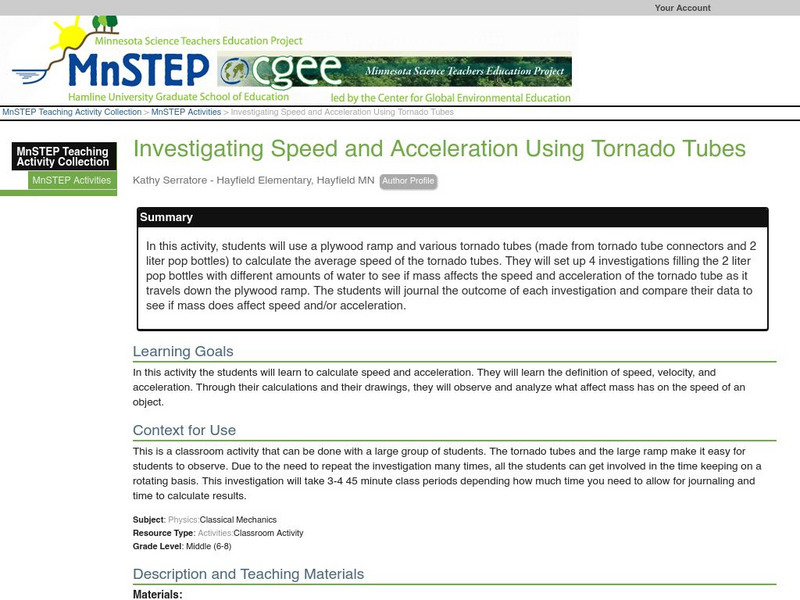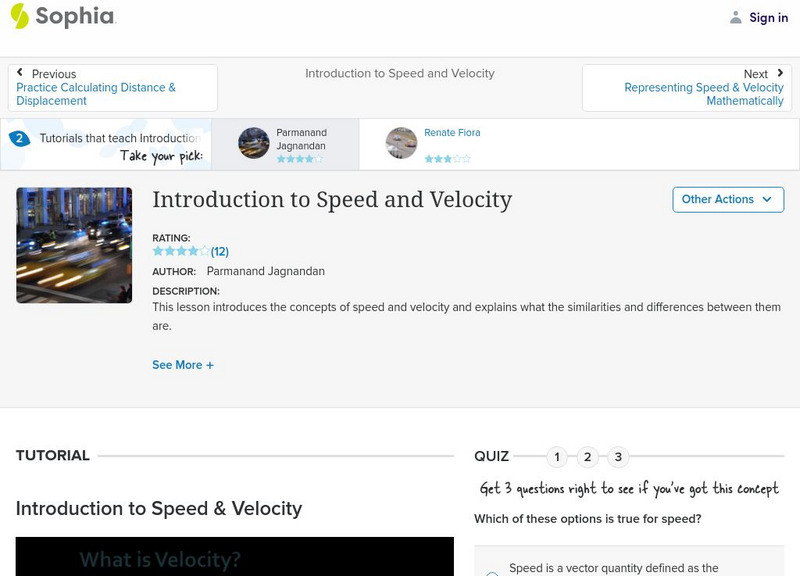Hi, what do you want to do?
Curated OER
Engineering in a Calculus Classroom
Young scholars solve several differential equations. In this calculus lesson plan, students test their modulus calculation by testing different weights or beam lengths. They share their findings in class.
Curated OER
Going My Way (High School Math)
High schoolers solve uniform motion problems using formula d = rt.
Curated OER
Trundle Wheel
Sixth graders explore the uses of a trundle wheel. In this units of measurement lesson, 6th graders use trundle wheels to measure distances.
Curated OER
That Mu You Do
Students are told that the weight of a car is equal to its mass multiplied by the acceleration due to gravity. When a car is at react on a horizontal road, there must be a normal force with which the road pushes up on the car to keep it...
Curated OER
Worksheet 21 Spring 1996
In this math worksheet, students consider a path around the unit circle parameterized by σ on the interval [0, 1] with σ(t) = sin(5πt − π), cos(5πt − π). Then they find the vector.
Curated OER
Worksheet 2
In this math learning exercise, students plot the course for a ship traveling from one point to another using two Cartesian coordinates. Then they plot the vector of the course.
Curated OER
Earthquake on the Playground
Students investigate earthquakes by examining chart data. In this disasters lesson, students identify the waves that are recorded when an earthquake arises by reading sample graphs in class. Students participate in an...
Curated OER
Euler's Method
In this Euler's method worksheet, students use Euler's method to determine one-second time intervals in a rate problem. They explore functions to estimate rate changes in small time intervals. This two-page worksheet contains...
Curated OER
Light & Crystals
Students observe a demonstration of light refraction. They experiment with disappearing crystals to further study light refraction.
Curated OER
Newton's Law Vocabulary
For this Isaac Newton worksheet, students analyze ten words in a word box that pertain to Newton's Law. Students match these words to their definitions.
Curated OER
Running With Momentum
Young scholars discuss the conservation of momentum in a collision between two bumper cars. They are given the equation for momentum. Students then solve problems using the equation for momentum.
Curated OER
#22 Frames of Reference: The Basics
Students explore the concept of frames of reference in physics.
Khan Academy
Khan Academy: Speed and Velocity Questions
This is a 10-question quiz over speed and velocity.
Physics Classroom
The Physics Classroom: 1 D Kinematics: Speed and Velocity
Through illustrated examples and interactive practice problems, students examine the difference between speed and velocity.
Science4Fun
Science4 Fun: Speed and Velocity
What is speed? What is velocity? Illustrated discussion of speed and velocity including how they are measured.
Science Education Resource Center at Carleton College
Serc: Investigating Speed and Acceleration Using Tornado Tubes
In this activity, students will use a plywood ramp and various tornado tubes (made from tornado tube connectors and 2 liter pop bottles) to calculate the average speed of the tornado tubes. They will set up 4 investigations filling the 2...
Physics Classroom
The Physics Classroom: Circular and Satellite Motion: Speed and Velocity
In this interactive module, describe and explain the motion of objects that either move in circles or can be approximated to be moving in circles. Kinematic concepts and motion principles will be applied to the motion of objects in...
Science Education Resource Center at Carleton College
Serc: Investigating Speed and Velocity
In this investigation, students will work in groups to design a model roller coaster, which will be used to clock the fastest speed for the rider (ball bearing/marble) The groups will build roller coaster models and modify and adjust...
Oswego City School District
Oswego City School District: Speed and Velocity
This animated tutorial illustrates distance and displacement to define speed and velocity.
Ducksters
Ducksters: Physics for Kids: Speed and Velocity
Kids learn about speed and velocity in the science of physics and the laws of motion including units and measurement. What is the difference between speed and velocity?
Sophia Learning
Sophia: Speed & Velocity
A slide show with three accompanying video lesson segments illustrating the difference between speed and velocity, and demonstrating how to calculate average speed and velocity. [6:31]
University of California
Ucla: Speed and Velocity
Discusses the meaning of velocity in terms of a graphical representation. Calculus-based discussion. Good graphics.
CK-12 Foundation
Ck 12: Episd: Velocity 1
[Free Registration/Login may be required to access all resource tools.] Using mathematic equations for speed and velocity students will breakdown one dimensional motion.
Sophia Learning
Sophia: Introduction to Speed and Velocity: Lesson 1
This lesson introduces the concepts of speed and velocity and explains what the similarities and differences between them are. It is 1 of 2 in the series titled "Introduction to Speed and Velocity."
Other popular searches
- Average Speed and Velocity
- Speed and Velocity Problems
- Speed and Velocity Science
- Speed and Velocity Labs
- Motion Speed and Velocity
- Speed and Velocity Graphing
- 11.2 Speed and Velocity
- Determine Speed and Velocity
- Velocity and Speed
- Calculate Speed and Velocity
- 112 Speed and Velocity
- Determing Speed and Velocity


























